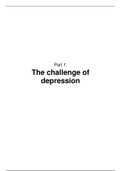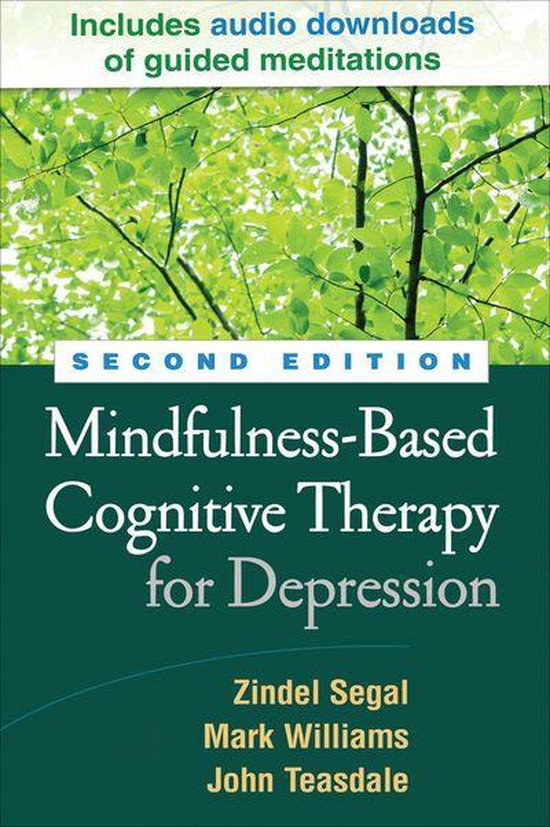Part 1:
The challenge of
depression
,CHAPTER 1: DEPRESSION CASTS A LONG S HADOW
Depression: a disorder of mood that affects a person’s capacity to think clearly; undermines
motivation to act; alters intimate bodily functioning, such as sleeping and eating; and leaves a person
feeling stranded in the midst of searing mental pain and suffering he or she feels unable to do
anything about.
Depression is not only feeling blue → syndromal nature, consists of a combination of elements rather
than a single feature.
Clinical depression (major depression): a state in which persistent depressed mood or loss of
interest occurs with other reliable physical and mental signs, such as difficulties sleeping, poor
appetite, impaired concentration, and feelings of hopelessness and worthlessness. → diagnosed when
having multiple symptoms, for at least two weeks.
There is no single face to the disorder, no single feature that tells the whole story.
There is a low rate of mental health services. It is a public health issue → response:
1. Publicity to educate the public about the symptoms and available treatments.
2. Appreciation of the degree of disability associated with the disorder → it is not only emotional
pain, also physical.
EARLY OPTIMISM ABOUT THE TREATMEN T OF DEPRESSION
Antidepressants had become in 1980 and still, the main treatment for clinical depression. But for
moderate depression, they might not work.
Four psychological treatments:
1. Behavioural approach: increase depressed person’s participation in reinforcing or pleasure-
giving activities.
2. Social skills training: corrected behavioural deficits that increased depressed persons’ social
isolation and rejection.
3. Cognitive therapy: brought together a number of behavioural and cognitive techniques, with
the joint aim of changing the way a persons’ thoughts, images, and interpretation of events
contribute to the onset and maintenance of the emotional and behavioural disturbances
associated with depression.
4. IPT: learning to resolve interpersonal disputes and changing roles would alleviate depression.
→ cognitive and interpersonal therapies became the gold standards:
1. The therapies were tested in multiple studies in different centres.
2. They used clinical patients who met standard diagnostic criteria for depression.
3. When evaluated against antidepressant medication, their efficacy was judged to be
equivalent.
DEPRESSION AS A CHRONIC RELAPSING CONDITION
Why is chronic depression not been noticed before?
1. Much of the data on which our understanding of depression was based came from studies
conducted in the earlier part of the 20th century.
2. We had not realized how recurrent depression could be because there had been no studies in
which patients who recovered from the disorder had been followed and evaluated at regular
intervals.
1. Acute conditions: short term.
2. Chronic conditions: long term.
→ firstly, treatments were mostly based on acute conditions, but nowadays, also for chronic
conditions.
Distinguishing among patients on the basis of the number of past episodes continues to be one o ft
he most reliable predictors of future depression.
HOW COULD DEPRESSIVE RELAPSE AND RECURRENCE BE PREVENTED?
Study: give one group a placebo and one group antidepressants after recovery → 50% of the placebo
was depressive again, and only 20% of the antidepressant group was.
Recurrence: new episode of depression
,Relapse: the worsening of a previously controlled episode that had not yet run its course.
If people stopped the medication before the episode had run its course, they risked rapid relapse.
Distinct prescriptions of antidepressants:
• Acute.
• Continuation.
• Maintenance.
Note: antidepressants do not provide a long-term cure. To prevent future depression continue the
same treatments that worked in alleviating the acute episode of depression.
PSYCHOTHERAPY AS A MAINTENANCE TREATMENT
Not everyone can take antidepressants → pregnant women, surgery etc.
People with IPT did fall back in depression after a longer time than people with the placebo.
, CHAPTER 2: WHY DO PEOPLE WHO HAVE RECOVERED FROM DEPRESSION
RELAPSE?
DEVELOPING A MAINTENANCE VERSION OF COGNITIVE THERAPY
Should we consider alternative approaches?
1. There needed to be a more cost-efficient solution than to continue to rely on one-to-one
psychotherapy.
2. Treating acute depression with ‘standard’ cognitive therapy already prevented relapse in many
patience.
THE LONG-LASTING EFFECTS OF COGNITIVE THER APY
Cognitive therapy could reduce the risk of future relapse.
1. If cognitive therapy were shown reliably to reduce rates of relapse following recovery to the
level of 20-36% then why develop a maintenance version at all?
2. The data implied that the practice of cognitive therapy had taught people something that, once
learned, protected them against future depression.
Why should all the options be so confined? Why not use one approach to deal with acute depression
and another to keep people well once they have recovered? → maybe give antidepressants during
acute depression and then maintain with cognitive therapy.
First ask two questions:
1. What are the important psychological mechanisms involved in depressive relapse?
2. How are these modified during the course of acute cognitive therapy?
→ second question is hard to answer, we did not know how cognitive therapy’s effects reduced risk of
relapse.
COGNITIVE VULNERABILITY TO RELAPSE AND RECURRENCE
The way we think about ourselves, the world, and the future can have a major effect on our emotions
and behaviour.
Vulnerability: the risk of becoming depressed again once the person has recovered from an episode.
How can we measure this vulnerability?
ARE PERSISTING DYSFUNCTIONAL ATTITUDES THE CAUSE OF RELA PSE?
Items on the dysfunctional attitude scale describe attitudes or assumptions that reflect, as it were, a
personal contract for maintaining self-worth. → if I succeed in everything, I will be happy.
Formerly depressed patients, even if not depressed now, should have higher scores on the
dysfunctional attitude scale than those who had never been depressed → however, the scores of
recovered patients, tested in normal mood, were not distinguishable from the scores of never-
depressed people.
SAD MOODS CAN REAWAKEN. NEGATIVE THOUGHT PATTERNS: A BASIS FOR
UNDERSTANDING VULNERABILITY
If nondepressed people were experimentally induced into mild depressed moods, then they showed
negative biases in memory. They were less likely to recall pleasant events in their lives, and more
likely to recall negative events. How are such biases caused?
There is an importance difference in people who have never been depressed and people who
recovered from a depression in how they act when they were in a sad mood. During an episode of
depression, people experience a depressed mood and negative thinking → what if the brain links
these two to one another? So when depressed people are in a sad mood, they could relapse.
Conclusion: persons with a history of major depression, states of mild sadness would be more likely to
progress to more intense and persistent states, increasing the risk of future onset of major depressive
episodes.
SAD MOODS REACTIVATE VULNERABLE ATTITUDES AND BELIEFS
Patients with the greatest increase in dysfunctional beliefs following the mood challenge were more
likely to suffer a relapse over the subsequent 30 months.
Cognitive reactivity: the tendency to react to small changes in mood with large changes in negative
thinking. → needs to be addressed in order to prevent depression.





